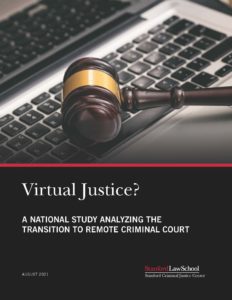COVID-19 and the Effect of Video Technology on Indigent Defense Services (807U)
As a result of COVID-19, most jurisdictions in the country rapidly moved court and court-related communications from in-person to audio- and video-conferencing. Providers of indigent defense services have identified concerns associated with this move, including the effect it has on attorney-client relationships and confidentiality and the ability of clients to access reliable technology.
In partnership with National Association of Criminal Defense Lawyers (NACDL) and with the involvement of Stanford Sociology Professor Matthew Clair, the Stanford Criminal Justice Center is conducting a study on the uses, dynamics and effects of remote technology at different stages of criminal proceedings in light of COVID-19. The project will entail both a national survey (survey will be sent out nationally during August 2020 and students will analyze results) and in-depth interviews with a range of stakeholders in a handful of jurisdictions to assess how technology is being used and develop best practice for the delivery of indigent defense services during and after the pandemic.
Clients & Deliverables
Client: National Association of Criminal Defense Lawyers
Deliverables: Final report: Virtual Justice? A National Study Analyzing the Transition to Remote Criminal Court

How to Apply
Student applications are by consent of the instructor. Please apply at https://registrar.law.


